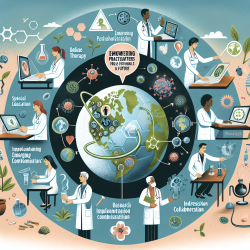Introduction
In the realm of speech-language pathology, the emphasis on data-driven decisions and evidence-based practices is paramount. The research article "Orangutans venture out of the rainforest and into the Anthropocene" offers valuable insights that can be translated into our field to improve outcomes for children. This blog post will explore how the findings from this study can inspire practitioners to enhance their skills and encourage further research.
Understanding Adaptability and Resilience
The research highlights the adaptability and resilience of orangutans in the face of human-induced environmental changes. This adaptability is crucial for their survival in the Anthropocene, a period characterized by significant human impact on the environment. Similarly, in speech-language pathology, understanding and fostering adaptability in children can lead to better outcomes.
Practitioners can apply this concept by:
- Encouraging flexible thinking and problem-solving skills in children.
- Adapting therapy techniques to suit individual child needs and environmental changes.
- Promoting resilience by building confidence and coping strategies in children.
Multifaceted Approaches for Better Outcomes
The study underscores the importance of a multifaceted, landscape-level approach to conservation, involving various stakeholders. In speech-language pathology, a similar approach can be beneficial. By collaborating with teachers, parents, and other professionals, practitioners can create a supportive environment that enhances therapy outcomes.
Implementing a multifaceted approach involves:
- Collaborating with educators to integrate speech therapy goals into classroom activities.
- Engaging parents in the therapy process to reinforce skills at home.
- Working with other professionals, such as occupational therapists, to address the holistic needs of the child.
Encouraging Further Research
The research on orangutans provides a compelling case for the continuous study of human-animal interactions and their implications. For speech-language pathologists, staying abreast of the latest research is vital for effective practice. Encouraging practitioners to engage in or support research initiatives can lead to innovative approaches and improved therapy techniques.
Ways to encourage research involvement include:
- Participating in professional development opportunities and conferences.
- Collaborating with academic institutions for research projects.
- Incorporating evidence-based practices into everyday therapy sessions.
Conclusion
The insights gained from the study of orangutans in the Anthropocene can be a source of inspiration for speech-language pathologists. By embracing adaptability, adopting a multifaceted approach, and encouraging further research, practitioners can enhance their skills and improve outcomes for children. To read the original research paper, please follow this link: Orangutans venture out of the rainforest and into the Anthropocene.










